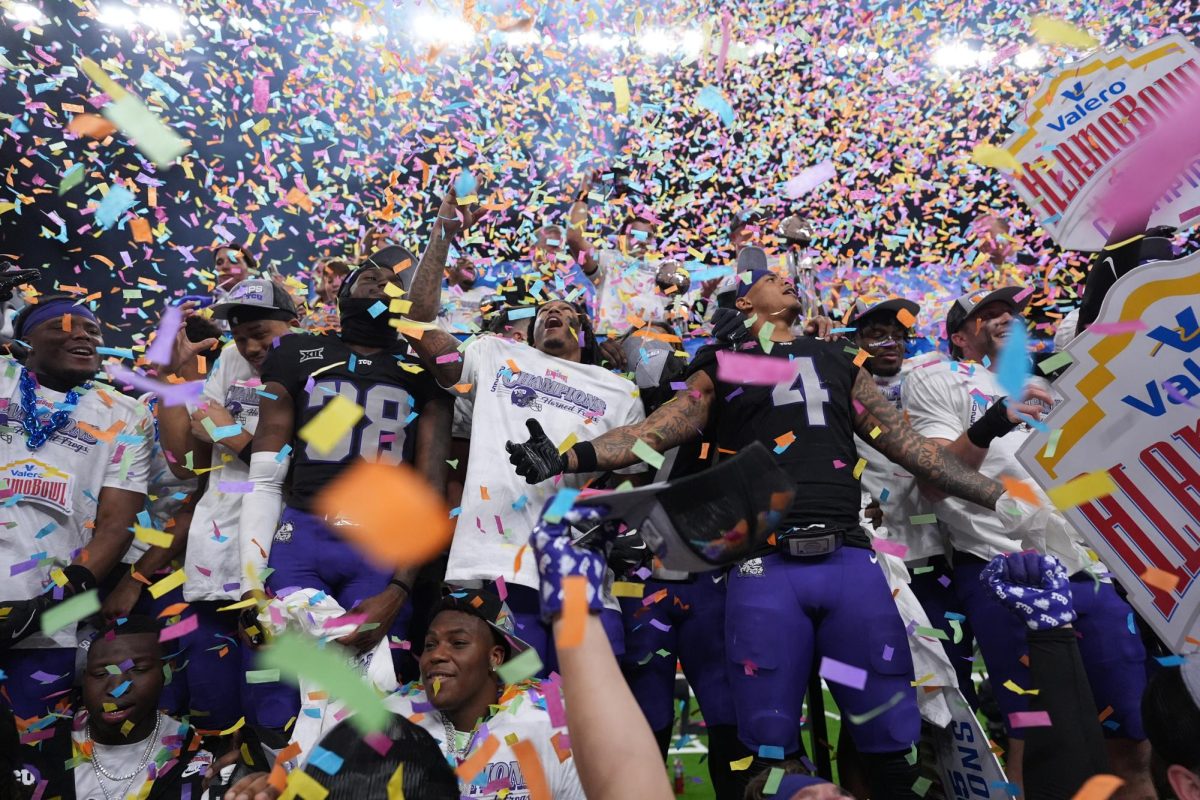Five yards behind a teed-up golf ball, Julien Brun, TCU’s star golfer, uses the technique of visualizing his upcoming shot.
Brun translates his visualization of shots into low scores, something he has been doing this his whole life.
Brun, a junior communication major from Antibes, France, is one of TCU’s most successful golfers since professional golfer J.J. Henry. Henry is currently 48th on the 2013-2014 PGA Tour money list.
Coming off of his sophomore season in which he won three events and earned nine top-10 finishes, Brun earned an exclusive spot as a Ben Hogan Award Finalist, given to the top collegiate golfer.
After winning the Spirit International Amateur Golf Championship in early November, Brun qualified for the upcoming Crowne Plaza Invitational held at Colonial Country Club in May.
Brun is no stranger to professional events.
Last year, he won the European Challenge Tour’s ALLIANZ Golf Open Toulouse Metropole in Selih, France. Brun said the win was his greatest accomplishment yet.
TCU golf coach Bill Montigel drew comparisons from J.J. Henry to Brun, saying both are fantastic golfers. Montigel said Henry’s game developed later on in college rather than Brun’s, who came out of the gates really fast as a First-Team All-American in each of his first two years at TCU.
Brun moved up from being ranked eighth in last years Golf Digest’s top 50 male players, to being ranked third for the 2013-2014 golf season.
Montigel said not only is Brun’s golf game still developing, but so is his physique.
“Julien is working really hard off of the course with strength in the weight room,” Montigel said. “He is stronger than he has ever been.”
Although strength conditioning has been somewhat of a new part in Brun’s game, Montigel said there is not much more he needs to do to improve.
“As far as I know, the only thing he is really working on is trying to do all of the little things right, because he is already one of the top amateurs in the world,” Montigel said.
The “little things” refer to the technique in Brun’s swing which can allow him to be more consistent and accurate.
What’s different this year?
Brun said that during his freshman and sophomore years at TCU, he had a lot of free time to go out and practice new shots on courses such as Glen Garden Golf and Country Club and Shady Oaks Country Club. This year it’s all business, as he hopes to receive his PGA Tour card in the near future.
Brun said he is focused on not only improving certain techniques in his game, but also building his physique because he has noticed how muscular and fit professional golfers are.
“Getting stronger gives me the ability to do more types of shots off the tee,” Brun said.
Brun said college golf has helped him with conditioning and preparing for the professional level because college golfers play 36 holes a day in a tournament.
“If we tee off at eight, I have to wake up at five and go to the gym for 30 minutes to warm up and get loose,” Brun said. “Getting my body in the gym really gets me going and makes me feel better off that first tee.”
Paul Barjon, a long-time friend of Brun and member of the golf team, said Brun has worked on his long game rather than his short game because distance seems to be the only aspect that is somewhat lacking.
Since the TCU golf team plays on some of the most difficult courses in the world, such as Crooked Stick and Muirfield Village, adding a bit more distance to Brun’s game will allow him to adjust to the rigid professional conditions of a course, Barjon said.
Brun learns life lessons from golf
Brun compared golf to an important life lesson he has learned: taking responsibility for your mistakes.
“Golf is really frustrating and really hard mentally when things are not going your way,” he said. “You have to be able to accept the mistakes you make and play a shot-by-shot game.”
Values such as being humble, making good decisions and perseverance have helped Brun in his golf game, which, in return, has helped shape his life, Brun said.
These values have come from times when Brun was frustrated on the golf course and realized that his frustration needed to be tamed in order to be composed and compete, he said.
Barjon said golf is a gradual process that requires a lot of practice to help shave strokes of your scorecard, something many pros still struggle with.
“When you think you are at the best level in golf and you understand the game, usually the game just says ‘nope,’” Brun said.
Golf’s misfortunes can be seen as a good thing because it allows you to confront the mistakes and figure out what you need to work on to compete with the pros, Brun said.
“We are never enough prepared in that sport,” Barjon said. “[Brun] is still improving, and I am pretty sure he’ll be more than ready to turn pro after his graduation.”
An average college kid
While Brun is a standout golfer, he is like any other TCU student away from the course. Like most college students, he doesn’t like to take tests, and he enjoys hanging out with his friends on and off the golf course, he said.
And since the barrier of entry into professional golf is so hard to break through, Brun said a degree from TCU is something that he will always have.
“I really want to get my degree and then try and go pro,” Brun said. “It is always good to have a backup because in golf, if you get injured, you don’t have a paycheck coming.”
Brun said he is excited for the future, but he has loved the time he has spent at TCU.
“College goes by so fast, and it is just the best life here,” Brun said. “College golf is so much fun because you get to play on some of the best courses with your teammates and best friends.”
Montigel said Brun differs from other college students in some ways, one being that Brun is one of the most disciplined people he’s ever seen.
“A typical college kid, [coming] in as a freshman would much rather, at 11:30 p.m. on a Friday night, go to a party,” Montigel said. “He’s got the discipline to go to bed early and get up in the morning to hit balls.”
Montigel said he has seen so many golfers over the years who have had potential but lacked Brun’s disicipline .
The difference, Montigel said, is that Brun “can see the future.”







